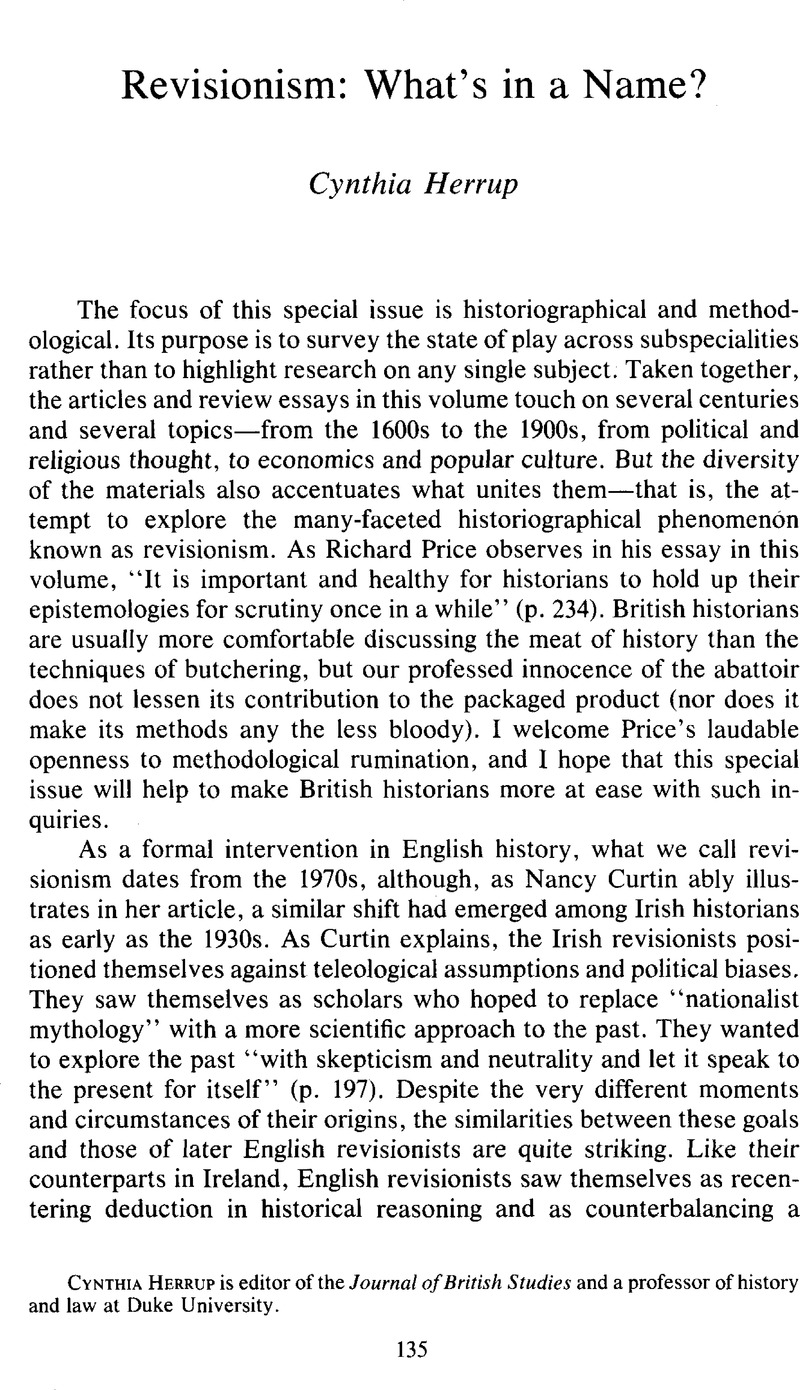Article contents
Revisionism: What's in a Name?
Published online by Cambridge University Press: 10 January 2014
Abstract

- Type
- Introduction
- Information
- Copyright
- Copyright © North American Conference of British Studies 1996
References
1 The most complete introduction to the concept as it has come to be used in the historiography of seventeenth-century England can be found in the work of two friendly critics, Cust, Richard and Hughes, Ann, “Introduction: After Revisionism,” in Conflict in Early Stuart England: Studies in Religion and Politics, 1603–1642, ed. Cust, Richard and Hughes, Ann (London, 1989), pp. 1–46Google Scholar. See also the earlier summary by Hexter, J. H., “The Early Stuarts and Parliament: Old Hat and the Nouvelle Vague,” Parliamentary History 1 (1983): 181–216CrossRefGoogle Scholar; as well as critiques by J. H. Hexter, “Power Struggle, Parliament, and Liberty in Early Stuart England,” and Hirst, Derek, “Unanimity in the Commons, Aristocratic Intrigue, and the Origin of the English Civil War,” both in the Journal of Modern History 50 (1980): 1–50, 51–71CrossRefGoogle Scholar; and by Theodore Rabb, “Revisionism Revised: The Role of the Commons,” Derek Hirst, “Revisionism Revised: The Place of Principle,” and Hill, Christopher, “Parliament and People in Seventeenth-Century England,” all in Past and Present, no. 92 (August 1981), pp. 55–78, 79–99, 100–124Google Scholar. For a sample of early work by the revisionists themselves, see Russell, Conrad, Unrevolutionary England, 1603–1642 (London, 1990)Google Scholar; Sharpe, Kevin, ed., Faction and Parliament: Essays on Early Stuart History (London, 1978Google Scholar; reprinted with a new introduction, London, 1985); and the special issue on the English Revolution in the Journal of Modern History, vol. 49 (1977)Google Scholar.
2 Hexter, , “The Early Stuarts and Parliament,” p. 181Google Scholar; Russell, p. ix. Russell now appears willing to talk about revisionism as an “historiographical creed” (see his “Introduction,” in ibid.); cf. Sharpe, Kevin, “Revisionism Revisited,” in Sharpe, , ed., p. xviGoogle Scholar, for a less happy embrace of the label. Russell's, essay, “Parliamentary History in Perspective, 1604–1629,” originally appeared in History 61 (1976): 1–27CrossRefGoogle Scholar, and is reprinted in his Unrevolutionary England. Most scholars would add to the 1976 “convulsion” at least one prescient tremor caused by Elton, G. R. with his essay, “A High Road to Civil War?” in From the Renaissance to the Counter-Reformation: Essays in Honor of Garrett Mattingly, ed. Carter, C. H. (New York, 1965), pp. 325–47Google Scholar.
3 For its extension into earlier and later centuries of English history, respectively, see, most prominently, the work of Christopher Haigh (whose most recent book, English Reformations, is reviewed in this issue); and J. C. D. Clark.
- 1
- Cited by




